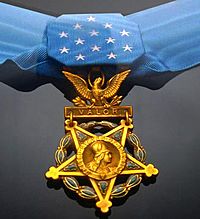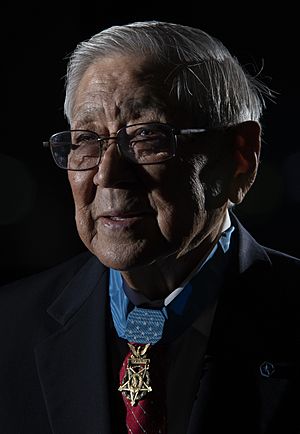Hiroshi H. Miyamura facts for kids
Quick facts for kids
Hiroshi H. Miyamura
|
|
|---|---|
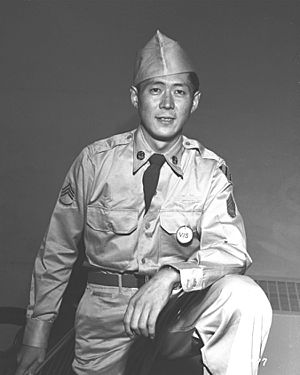
Miyamura as a Staff Sergeant
|
|
| Nickname(s) | Hershey |
| Born | October 6, 1925 Gallup, New Mexico, U.S. |
| Died | November 29, 2022 (aged 97) Phoenix, Arizona, U.S. |
| Allegiance | United States |
| Service/ |
United States Army |
| Years of service | 1945–1953 |
| Rank | Staff Sergeant |
| Unit |
|
| Battles/wars | |
| Awards |
|
| Other work | Automobile mechanic and service station owner |
Hiroshi H. Miyamura (October 6, 1925 – November 29, 2022) was a brave soldier in the United States Army. He received the Medal of Honor, which is the highest award for bravery a soldier can get in the U.S. military. He earned this award for his amazing actions during the Korean War.
Hiroshi Miyamura was one of the last two soldiers from the Korean War to still be alive who had received the Medal of Honor. What's interesting is that when he was first given this award, it was kept a secret. This was because he was a prisoner of war at the time.
Contents
Early Life and Family
Hiroshi Miyamura was born in Gallup, New Mexico. His parents, Yaichi and Tori Miyamura, had moved to the U.S. from Japan. This made Hiroshi a Nisei, which means he was a second-generation Japanese American.
His family bought a diner that was open 24 hours a day. Hiroshi was the fourth of nine children. When he was 11, his mother passed away. He got the nickname "Hershey" because one of his teachers had trouble saying his first name correctly.
Serving His Country
Joining the Army in World War II
When the United States entered World War II, there were worries about Japanese Americans. President Franklin D. Roosevelt ordered many Japanese Americans living near the coast to move to special camps. However, in Gallup, New Mexico, where Hiroshi lived, Japanese American families were allowed to stay in their homes.
Hiroshi Miyamura joined the United States Army in January 1945. He chose to be part of the 100th Infantry Battalion and the 442nd Infantry Regiment. These units were special because they were mostly made up of Japanese American soldiers. He trained to be a machine gunner. Soon after Japan gave up, he left the army. Later, he joined the United States Army Reserve.
Heroic Actions in the Korean War
When the Korean War began, Miyamura was called back to active duty. He arrived in North Korea in November 1950. He earned the Medal of Honor for his incredible bravery on April 24–25, 1951. This happened near the Imjin River in Korea.
Miyamura was a corporal at the time. During a surprise night attack by Chinese forces, he saw that his squad was in great danger. He quickly told his men to fall back to a safer spot. He stayed behind to protect them as they left. He fought bravely, stopping at least fifty enemy soldiers.
Captured and Honored in Secret
Right after his heroic actions, Miyamura was captured. He became a prisoner of war (POW). As he and other prisoners were forced to march, he helped his injured friend, Joe Annello. The North Koreans threatened to shoot Miyamura if he didn't leave his friend behind. But Miyamura refused to leave Annello. Eventually, Annello convinced Miyamura to put him down. Luckily, Annello survived the war and later visited Miyamura. The prisoners had to march about 300 miles over five weeks with very little food.
Miyamura's Medal of Honor was the first one ever to be kept a secret. General Ralph Osborne explained why. He said that if the enemy knew how many of their soldiers Miyamura had stopped, they might have hurt him. Keeping it a secret helped keep him safe while he was a prisoner.
Miyamura was held for 28 months. After he was set free on August 20, 1953, he learned about his Medal of Honor. He was also promoted to sergeant. He returned to the United States and left the military honorably. President Dwight D. Eisenhower personally gave him his medal in October 1953 at the White House.
Medal of Honor Citation
Corporal Miyamura was a machinegun squad leader. During a fierce enemy attack, he bravely jumped from his shelter. He fought hand-to-hand with his bayonet, stopping about 10 enemy soldiers. He then helped his wounded comrades and made sure they were moved to safety.
When another strong attack hit, he used his machinegun until he ran out of bullets. He told his squad to leave while he stayed behind to make the gun unusable. He then fought his way through enemy soldiers to another gun and helped use it.
When the company had to retreat, Corporal Miyamura told his men to fall back. He stayed to cover their escape. He stopped more than 50 enemy soldiers before he ran out of ammunition and was badly hurt. Even with his painful wounds, he kept fighting until his position was completely surrounded. When last seen, he was fighting fiercely against many enemy soldiers. Corporal Miyamura's incredible bravery and dedication showed great honor to himself and the military.
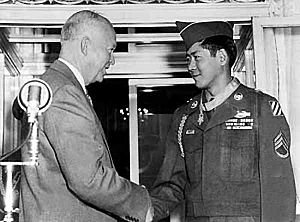
Awards and Recognition
Hiroshi Miyamura received many awards for his service. Besides the Medal of Honor, he also earned the Meritorious Service Medal and the Purple Heart. The Purple Heart is given to soldiers who are wounded in battle. He also received the Prisoner of War Medal for his time as a POW.
His other awards include:
- World War II Victory Medal
- National Defense Service Medal
- Korean Service Medal
- United Nations Korea Medal
- Korean War Service Medal
- Combat Infantryman Badge
- Republic of Korea Presidential Unit Citation
Life After the War
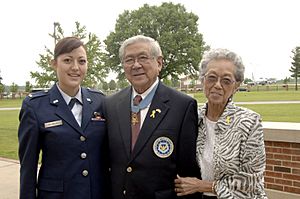
Miyamura married Tsuruko "Terry" Tsuchimori. They had three children and four grandchildren. One of his grandchildren, Marisa, became an officer in the United States Air Force.
After leaving the army, Miyamura returned to Gallup, New Mexico. He became an automobile mechanic and owned a service station. He continued to help other veterans, including working with the Wounded Warrior Project. His story was even shared during the National Memorial Day Concert in Washington, D.C., in 2018.
In 2014, the FBI in Albuquerque gave him an award for his work with young people in his community. He also led the Grand Parade at the 2014 Nisei Week festival.
Hiroshi Miyamura passed away in Phoenix, Arizona, on November 29, 2022, at the age of 97.
Honoring His Legacy
In his hometown of Gallup, New Mexico, several places are named after him. There is an area called Miyamura, and a school named Hiroshi H. Miyamura High School. There is also the Miyamura Overpass, which is part of I-40. These names help remember his bravery and service.
See also
 In Spanish: Hiroshi H. Miyamura para niños
In Spanish: Hiroshi H. Miyamura para niños
- Battle of Yultong
- List of Korean War Medal of Honor recipients
- Medal of Honor (TV series) - Miyamura is featured in season 1 episode 4
 | Janet Taylor Pickett |
 | Synthia Saint James |
 | Howardena Pindell |
 | Faith Ringgold |


